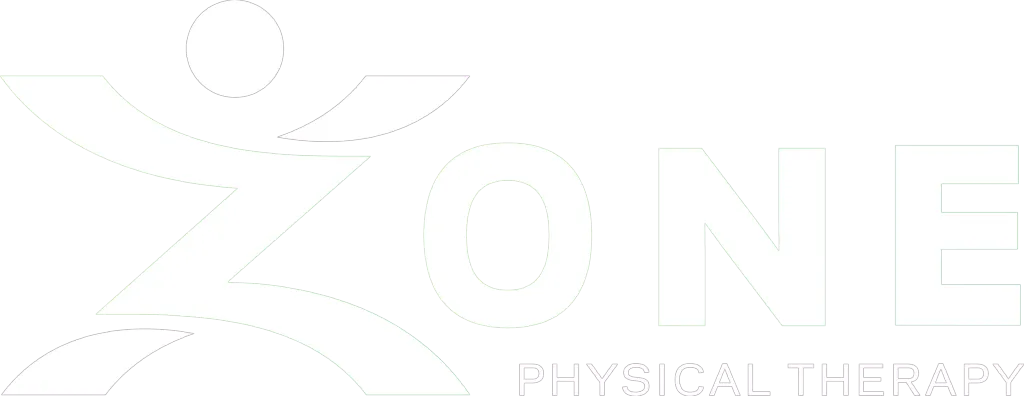Most people will have knee or hip discomfort at some point in their lives since these huge joints hold the whole weight of your body while also allowing for a broad range of motion. These are common pain points and we do see many clients with these issues in our office.
Therefore, we do recommend that someone that is experiencing pain in these areas seek help to alleviate the pain or eliminate it completely. To start, physical therapy is a great way to pinpoint some of the issues you are having, what could be causing the issues, and assess the right areas to come up with a plan on how to treat the problem areas.
If you’re someone struggling with a painful hip or knee (or even painful hips and knees), we encourage you to contact Zone Physical Therapy. Our team can offer several customizable and evidence-backed solutions that will improve your pain and function so you can get back on your feet with confidence.
7 Things A Physical Therapist Can Do For Your Hip and Knee Pain
1. Identifying the Problem
When you visit a physical therapist for hip or knee discomfort, you may anticipate a complete physical examination that involves a number of tests (such as measurements of your range of motion, strength, balance, sensation, joint alignment, and reflexes). In addition, your physical therapist will study your family and personal history, as well as cooperate with other medical experts engaged in your treatment.
All of this is done to confirm your diagnosis and discover any other issues that may be contributing to your hip or knee problem, such as muscle shortening or changed foot mechanics. It also assists in providing vital paperwork that may be used for things like workers’ compensation or deciding when you can safely return to work or sports.
2. Education and Understanding the Pain You Are Having
A physical therapist will spend a significant amount of time explaining your situation to you and your loved ones. Understanding why your hip or knee hurts helps drive you to stick to your treatment plan and ensure you understand how to prevent increasing your symptoms.
Education for patients and caregivers is especially necessary in specific situations, such as following joint replacement surgery. You and your loved ones will need to understand your surgeon’s activity limits and how to adhere to them (e.g., knowing the difference between partial vs. toe-toe weight bearing or posterior vs. anterior hip precautions). Physical therapy after a hip or knee replacement may improve results and reduce discomfort, so it’s well worth the moderate time and financial commitment.
3. Exercises for Therapeutic Purposes
Exercise has proven to be one of the most effective treatments for aching hips and knees caused by disorders such as osteoarthritis, ligament sprains, and muscle strains. A physical therapist can teach you which exercises are appropriate for your current stage of healing and kind of injury, as well as assist you improve or adjust them as needed.
4. Assess and Modify Posture to Ease Joint Strain
The amount of power and pressure sent through your hips and knees can be influenced by your posture whether sleeping, driving, walking, sitting, running, or doing job duties. A physical therapist has the skilled eye needed to diagnose and correct postural abnormalities, ensuring that your hips and knees are not overstressed during the day.
5. Provide Pain Relief Using Non-Invasive Modalities
Research investigations and individual case reports demonstrate that the following therapies can successfully reduce pain and improve function in patients suffering from hip and knee discomfort:
- Manual therapy (e.g., soft tissue mobilization, joint mobilization)
- Athletic taping (also called kinesiotaping)
- Therapeutic ultrasound
- Electrical stimulation
- Cryotherapy
These physical therapy approaches, like therapeutic exercise, are non-invasive, opioid-free, and suitable for people of all ages. Your physical therapist will get to know you and your medical history in order to ensure that all aspects of your personalized treatment plan are appropriate and advised for your requirements and objectives.
6. Understanding How to Use Adaptive Equipment and Devices
In many cases, temporary or permanent usage of adaptive equipment or technologies that might help you regulate knee or hip discomfort may be beneficial. A physical therapist can educate you how to use these devices efficiently and help you choose the right one for your condition.
Common gadgets that help our patients with hip and knee pain include:
- Walkers, crutches, or canes
- Custom or pre-fabricated orthotics and braces
- Grab bars, raised toilet seats, shower chairs, bed canes, and other devices that makes it easier to function within your environment
7. Implement Injury Prevention Strategies
Understanding when and how to properly adjust your functional activities in order to get through your day is part of managing your chronic joint pain. This is especially significant with hip and knee pain, as dysfunction in these joints can increase the risk of balance difficulties and falls, particularly in older persons.
When you have a persistently sore hip or knee, a physical therapist can teach you how to use injury prevention measures like:
- Teaching you how to reduce joint tension when getting in and out of a car, moving up and down stairs, getting in and out of bed, and so on.
- Teaching energy-saving techniques to enhance better pain management and activity engagement
- Making recommendations for environmental and ergonomic changes in the home and workplace
Physical therapy can be incredibly effective for those who have hip and knee discomfort. If you are seeking solutions to lessen or eliminate discomfort, we recommend that you come to Zone PT. If you get the right treatment plan in place, it could change your life.
Would You Like Physical Therapy to Help With You Hip and Knee Pain…
Zone Physical Therapy would love to help answer your questions about your body. Your hip and knee pain might be keeping you from those weekend hikes, playing sports, or just day to day activities because the pain might just be unbearable.
In our clinic, we are able to assess any issues that you might be having that is keeping you from a enjoying life with as little to no pain as possible.
Our team have helped so many with hip and knee pain, and we would love to help you!
To arrange a visit to our office and talk about your hip and knee pain- Request An Appointment or call us on (864) 351-7254.



